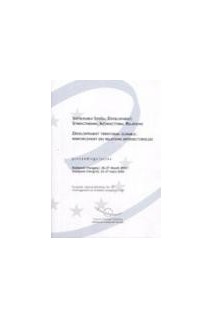This international seminar examined how the strengthening of intersectoral relations can be effective means to attain sustainable spatial development: it helps to bring groups in society together, to learn about different cultures and appreciate diversities and to combine forces in the effort to solve problems. Spatial planning plays an important role in the strengthening of intersectoral partnerships: it is, by definition, interdisciplinary, intersectoral and potentially international. The diversity of the natural environment, of culture traditions and values and of national and ethnic characteristics is a significant European asset to be preserved and enhanced in the context of globalisation. It is most important to reduce the differences between countries, regions and municipalities of Europe in areas such as quality of life, opportunities, economic prospects, prosperity to drinking water, treatment of waste water, waste collection and disposal, public transport, sustainable construction - was analysed particularly closely in this context.
I. Opening speeches
II. First session
Which intersectoral relations?
III. Second session
Relations between spatial planning and the sectoral policies
IV. Third session
V. Fourth session
Conclusion




